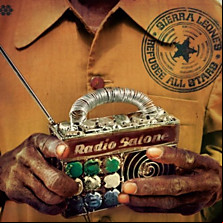BBC Review 1bj6o
A great third album, buoyed by producer Victor Axelrod.
Jon Lusk 2012
It's an oft-repeated cliché that the producer maketh the band. But in the case of this third album by Sierra Leone’s Refugee All Stars, it's more or less a truism.
In teaming up with American producer, arranger, musician and songwriter Victor Axelrod (known for his work with Easy Star All-Stars, Antibalas and Amy Winehouse), this band have not really done anything new, but simply concentrated more on one thing they did well before. That was playing a distinctly West African style of roots reggae.
They also still do their own take on Congolese soukous – certain to endear them to summer festival crowds – and keep things fairly close to their own roots. This is most obvious on the four Goombay Interludes that punctuate the album, featuring the traditional kongoma thumb piano. Then, with Man Muyu, they offer a hurried and rather lightweight Afrobeat.
Lyrically, they continue to comment on issues from a political perspective. Gbara Case attacks the scourge of witchcraft, and Big Fat Dog is a parable about the evils of not sharing, which chimes well with the band’s involvement in the World Food Programme.
As a player, Axelrod first appears with wonderfully luminous organ on early highlight Reggae Sounds the Message, which sounds like it could have been a hit for Toots and the Maytals. The atmospheric, suspenseful dub intro to Toman Teti M’Ba Akala offers further proof of why Axelrod was such a good choice.
Guest brass players make their punchy presence felt on Mother in Law. The rapper/ragga stylist Black Nature doesn’t contribute, so maybe he’s left the band; as has Sister Grace, who is listed amongst the "All Stars Family Up Above" in the credits.
If you’re wondering what the album title means, “Salone” is Krio shorthand for Sierra Leone, and it’s also a reference to the important role radio played during Sierra Leone’s terrifying civil war, offering those in refugee camps an escape as well as a connection to the outside world. 2012 marks the 10th anniversary of the end of the war, and this album makes it a happier anniversary.



